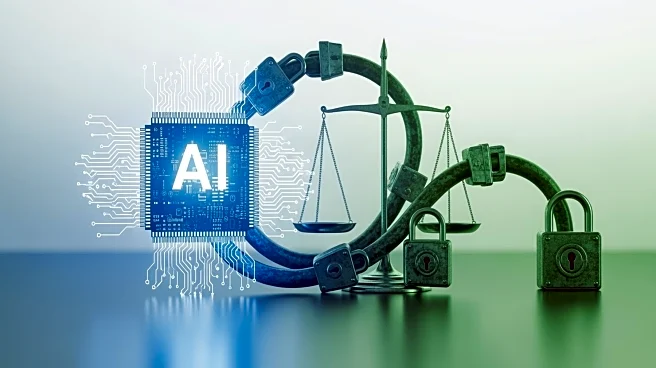What's Happening?
AI-generated code, known as vibe coding, is transforming the programming landscape by enabling anyone to become a developer. However, this rapid development process is raising concerns about judgment and security. According to OX Research, AI-generated code introduces
vulnerabilities at a similar rate to human-generated code, but the speed at which it reaches production is unprecedented, often bypassing traditional code review processes. This has led to breaches through vibe-produced code that were missed during reviews. Additionally, AI lacks the experience and judgment that human programmers develop over years, leading to the introduction of anti-patterns—ineffective coding practices that can be counterproductive. Common issues include excessive commenting, lack of perfectionism, and over-specification, which can result in single-use solutions rather than reusable components.
Why It's Important?
The implications of AI-generated code are significant for the tech industry and cybersecurity. As AI coding tools become more prevalent, the risk of vulnerabilities slipping through the cracks increases, potentially leading to security breaches and compromised systems. This poses a challenge for companies relying on AI for software development, as they must balance the benefits of rapid coding with the need for thorough security measures. The lack of human judgment in AI coding can result in long-term issues, as inexperienced users may not adhere to best practices, storing up problems for the future. The tech industry must address these challenges by embedding security guidelines directly into AI workflows and developing best practices for AI coding tools.
What's Next?
To mitigate the risks associated with AI-generated code, the industry must focus on improving AI systems and educating users on best practices. This includes developing better prompting techniques for code instigators and transitioning coders into architects who can oversee AI coding processes. Companies may need to rethink their current development processes to prevent buggy software from slipping through. OX Research suggests embedding security guidelines directly into AI workflows to catch issues early. As AI coding tools evolve, it is crucial for stakeholders to remain vigilant and take precautionary measures to ensure the security and effectiveness of AI-generated code.
Beyond the Headlines
The rise of AI-generated code highlights broader ethical and cultural implications. As AI tools democratize programming, they challenge traditional notions of expertise and skill in software development. This shift may lead to a reevaluation of the role of human judgment in coding and the importance of experience in producing high-quality software. Additionally, the reliance on AI for coding raises questions about accountability and responsibility for code quality and security. As AI coding tools improve, the industry must navigate these ethical considerations to ensure that technology serves the public interest and maintains trust in digital systems.
















